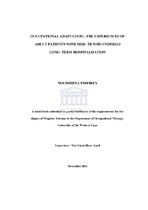| dc.contributor.advisor | Hess- April, Lucia | |
| dc.contributor.author | Firfirey, Nousheena | |
| dc.date.accessioned | 2016-11-08T16:47:46Z | |
| dc.date.available | 2016-11-08T16:47:46Z | |
| dc.date.issued | 2011 | |
| dc.identifier.uri | http://hdl.handle.net/11394/5300 | |
| dc.description | Magister Scientiae (Occupational Therapy) - MSc(OT) | en_US |
| dc.description.abstract | TB is a multi- faceted public health problem spurred on by the biological
progression of the disease as well as the social issues associated with it. The
treatment of TB is however primarily driven by the medical model where the
focus is on the disease and not on a holistic view of the patient. Occupational
therapy is a profession concerned with the use of occupation in the promotion of
health and well being through the facilitation of the process of occupational
adaptation. There is however a paucity of literature pertaining to the role that
occupational therapy could play within the TB context. The aim of this study was
to explore how adults with MDR- TB who undergo long-term hospitalisation at a
hospital in the Western Cape experience occupational adaptation. The objectives
of the study were to explore how the participants perceive their occupational
identity, to explore the meaning and purpose the participants assign to their
occupational engagement and to explore the how the participants perceive their
occupational competence. The interpretive research paradigm employing a phenomenological qualitative research approach was utilized in this study. Purposive sampling was used to select four participants based on specific selection criteria. The data gathering methods utilized included diaries, semistructured interviews, participant observation and a focus group. Photographs taken by the researcher for the purpose of participant observation were used to elicit a rich, in depth response from the participants during the focus group discussion. All data was analysed through thematic content analysis. The study findings highlighted that the participants viewed themselves as occupational beings and that they valued the role that occupational engagement played in
facilitating their occupational competence and ultimately their ability to adapt to
long- term hospitalisation. The environmental demands and constraints that they
experienced however infringed their engagement in meaningful occupation and
hampered their ability to achieve occupational competence. It was recommended
that the hospital adopt an integrative intervention approach to the management of
MDR- TB patients that include principles of psychosocial rehabilitation and
occupational enrichment to address occupational risk factors and institutionalisation. | en_US |
| dc.language.iso | en | en_US |
| dc.publisher | University of the Western Cape | en_US |
| dc.subject | Occupational Competence | en_US |
| dc.subject | Health and well-being | en_US |
| dc.subject | Tuberculosis | en_US |
| dc.subject | Multi-Drug resistant tuberculosis | en_US |
| dc.title | Occupational adaptation : the experiences of adult patients with MDR- TB who undergo long- term hospitalisation | en_US |
| dc.rights.holder | University of the Western Cape | en_US |

